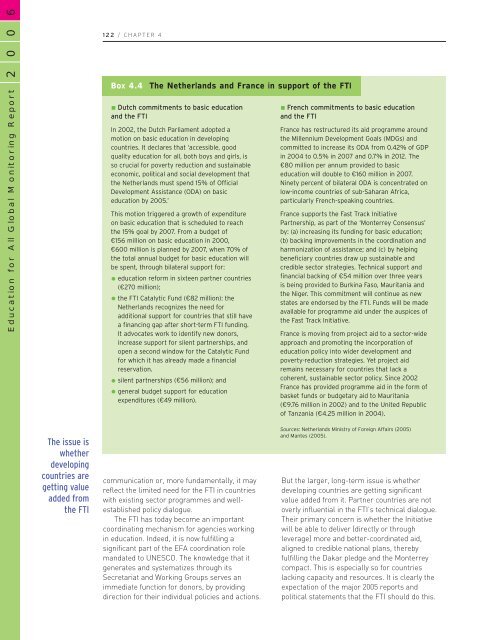literacy for life; EFA global monitoring report, 2006 - Institut de ...
literacy for life; EFA global monitoring report, 2006 - Institut de ...
literacy for life; EFA global monitoring report, 2006 - Institut de ...
Create successful ePaper yourself
Turn your PDF publications into a flip-book with our unique Google optimized e-Paper software.
0<br />
6<br />
0<br />
122 / CHAPTER 4<br />
2<br />
Education <strong>for</strong> All Global Monitoring Report<br />
Box 4.4<br />
The Netherlands and France in support of the FTI<br />
Dutch commitments to basic education<br />
and the FTI<br />
In 2002, the Dutch Parliament adopted a<br />
motion on basic education in <strong>de</strong>veloping<br />
countries. It <strong>de</strong>clares that ‘accessible, good<br />
quality education <strong>for</strong> all, both boys and girls, is<br />
so crucial <strong>for</strong> poverty reduction and sustainable<br />
economic, political and social <strong>de</strong>velopment that<br />
the Netherlands must spend 15% of Official<br />
Development Assistance (ODA) on basic<br />
education by 2005.’<br />
This motion triggered a growth of expenditure<br />
on basic education that is scheduled to reach<br />
the 15% goal by 2007. From a budget of<br />
¤156 million on basic education in 2000,<br />
¤600 million is planned by 2007, when 70% of<br />
the total annual budget <strong>for</strong> basic education will<br />
be spent, through bilateral support <strong>for</strong>:<br />
education re<strong>for</strong>m in sixteen partner countries<br />
(¤270 million);<br />
the FTI Catalytic Fund (¤82 million): the<br />
Netherlands recognizes the need <strong>for</strong><br />
additional support <strong>for</strong> countries that still have<br />
a financing gap after short-term FTI funding.<br />
It advocates work to i<strong>de</strong>ntify new donors,<br />
increase support <strong>for</strong> silent partnerships, and<br />
open a second window <strong>for</strong> the Catalytic Fund<br />
<strong>for</strong> which it has already ma<strong>de</strong> a financial<br />
reservation.<br />
silent partnerships (¤56 million); and<br />
general budget support <strong>for</strong> education<br />
expenditures (¤49 million).<br />
French commitments to basic education<br />
and the FTI<br />
France has restructured its aid programme around<br />
the Millennium Development Goals (MDGs) and<br />
committed to increase its ODA from 0.42% of GDP<br />
in 2004 to 0.5% in 2007 and 0.7% in 2012. The<br />
¤80 million per annum provi<strong>de</strong>d to basic<br />
education will double to ¤160 million in 2007.<br />
Ninety percent of bilateral ODA is concentrated on<br />
low-income countries of sub-Saharan Africa,<br />
particularly French-speaking countries.<br />
France supports the Fast Track Initiative<br />
Partnership, as part of the ‘Monterrey Consensus’<br />
by: (a) increasing its funding <strong>for</strong> basic education;<br />
(b) backing improvements in the coordination and<br />
harmonization of assistance; and (c) by helping<br />
beneficiary countries draw up sustainable and<br />
credible sector strategies. Technical support and<br />
financial backing of ¤54 million over three years<br />
is being provi<strong>de</strong>d to Burkina Faso, Mauritania and<br />
the Niger. This commitment will continue as new<br />
states are endorsed by the FTI. Funds will be ma<strong>de</strong><br />
available <strong>for</strong> programme aid un<strong>de</strong>r the auspices of<br />
the Fast Track Initiative.<br />
France is moving from project aid to a sector-wi<strong>de</strong><br />
approach and promoting the incorporation of<br />
education policy into wi<strong>de</strong>r <strong>de</strong>velopment and<br />
poverty-reduction strategies. Yet project aid<br />
remains necessary <strong>for</strong> countries that lack a<br />
coherent, sustainable sector policy. Since 2002<br />
France has provi<strong>de</strong>d programme aid in the <strong>for</strong>m of<br />
basket funds or budgetary aid to Mauritania<br />
(¤9.76 million in 2002) and to the United Republic<br />
of Tanzania (¤4.25 million in 2004).<br />
The issue is<br />
whether<br />
<strong>de</strong>veloping<br />
countries are<br />
getting value<br />
ad<strong>de</strong>d from<br />
the FTI<br />
communication or, more fundamentally, it may<br />
reflect the limited need <strong>for</strong> the FTI in countries<br />
with existing sector programmes and wellestablished<br />
policy dialogue.<br />
The FTI has today become an important<br />
coordinating mechanism <strong>for</strong> agencies working<br />
in education. In<strong>de</strong>ed, it is now fulfilling a<br />
significant part of the <strong>EFA</strong> coordination role<br />
mandated to UNESCO. The knowledge that it<br />
generates and systematizes through its<br />
Secretariat and Working Groups serves an<br />
immediate function <strong>for</strong> donors, by providing<br />
direction <strong>for</strong> their individual policies and actions.<br />
Sources: Netherlands Ministry of Foreign Affairs (2005)<br />
and Mantes (2005).<br />
But the larger, long-term issue is whether<br />
<strong>de</strong>veloping countries are getting significant<br />
value ad<strong>de</strong>d from it. Partner countries are not<br />
overly influential in the FTI’s technical dialogue.<br />
Their primary concern is whether the Initiative<br />
will be able to <strong>de</strong>liver (directly or through<br />
leverage) more and better-coordinated aid,<br />
aligned to credible national plans, thereby<br />
fulfilling the Dakar pledge and the Monterrey<br />
compact. This is especially so <strong>for</strong> countries<br />
lacking capacity and resources. It is clearly the<br />
expectation of the major 2005 <strong>report</strong>s and<br />
political statements that the FTI should do this.

















